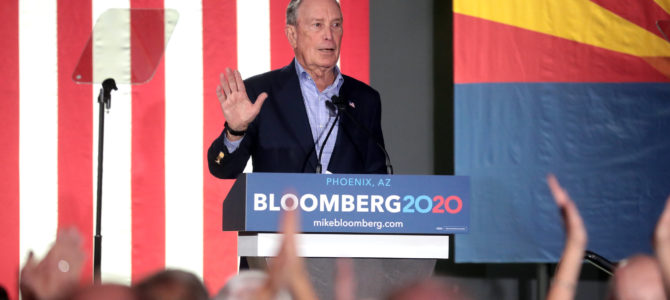
Former New York City Mayor Michael Bloomberg made a risky late entrance into the crowded Democratic presidential field in November with a strategy to skip the early primary states and focus on Super Tuesday.
Bloomberg has pumped an extraordinary amount of resources into the effort, running on virtually unlimited resources as the businessman with a Forbes-estimated net worth of $61.8 billion. He is self-funding his campaign and has already spent nearly $350 million with more than 2,000 people on staff. To put that into perspective, that’s more money than the rest of the Democratic field combined, excluding fellow billionaire Tom Steyer, who is also self-financing his run.
Bloomberg’s plan has been to ignore the first four primary contests held in Iowa, New Hampshire, Nevada and South Carolina, instead pivoting resources to the 16 contests scheduled to take place on March 3.
“It’s much more efficient to go to the big states, to go to the swing states,” Bloomberg explained to the New York Times earlier this month. “The others chose to compete in the first four. And nobody makes them do it, they wanted to do it… Those are old rules.”
At first glance, Bloomberg’s approach might be working. Just three months after making the fateful leap, Bloomberg is rising in the polls. According to RealClear-Politics’ latest aggregate of national surveys, Bloomberg is now riding in third place behind Vermont Sen. Bernie Sanders in first and former Vice President Joe Biden.
Much of Bloomberg’s steep climb has emerged within the last two weeks as the Democratic primary descends into disarray following a disaster at the first caucus in Iowa and a floundering frontrunner, prompting anxious Democrats to give Bloomberg a second look.
On Feb. 3, the Iowa Democratic caucuses suffered a meltdown when its vote-reporting app crashed as results were being sent to the state party. The fiasco left the public without a winner for the rest of the week. Once results did emerge from the contest: the caucuses revealed a much weaker candidate in Biden than many anticipated, with a strong turnout from Sanders capturing the popular vote followed by Buttigieg and Warren. Minnesota Sen. Amy Klobuchar even came close to defeating Biden.
In light of the chaotic caucus, Bloomberg seized on the opportunity to remind Democrats of another candidate running in the “moderate” lane while a self-described socialist comes off big wins in Iowa and New Hampshire with strong momentum. Bloomberg announced on the day after the Iowa caucuses while results had yet to be released that he would double his ad spending.
The outcome in New Hampshire has also played to Bloomberg’s advantage by sowing further doubts about Biden while propping up Buttigieg and Klobuchar as serious contenders in what is shaping up to be a long, competitive road to the nomination in Milwaukee. The process has played out perfectly for Bloomberg to capitalize on the chaos, but the Bloomberg build-up could be a bubble just waiting to pop.
At this point in the race, Bloomberg’s absence from the early contest states has allowed the businessman to steer clear of criticism from the other candidates, and there’s sure no shortage of content to go after.
Last month, the Democratic National Committee removed the donor threshold to qualify for its pirmary debates, opening the door for Bloomberg to land his first spot on stage to go head-to-head with the other candidates in a nationwide televised event. While Bloomberg still needs to place high enough in one more poll for a primetime podium, Bloomberg is likely to meet the requirements to face his Democratic rivals in Nevada.
Once Bloomberg begins to take serious flak from the other candidates on the debate stage next week, the billionaire’s meteoric rise very well may take a nosedive, depending on how Bloomberg is tested.
Meanwhile, Bloomberg’s record in New York is likely to come under heightened scrutiny that will only intensify as the other campaigns drop opposition research. Just earlier this week, an unearthed recording revealed Bloomberg touting his championing of New York City’s “Stop-and-Frisk” policing strategy that a federal judge ruled as uncontitutional racial harassment.
Put those cops where the crime is, which means in minority neighborhoods. So one of the unintended consequences is people say, ‘Oh my G-d, you are arresting kids for marijuana that are all minorities.’ Yes, that’s true. Why? Because we put all the cops in minority neighborhoods. And the way you get the guns out of the kids’ hands is to throw them up against the walls and frisk them.
Share this far and wide. Unless the mainstream media picks it up, it will be isolated to twitter. pic.twitter.com/Fm0YCi4ZRy
— Benjamin Dixon (@BenjaminPDixon) February 11, 2020
Bloomberg apologized for promoting the policing policy despite the success it had in reducing crime. But Bloomberg needs the support of African-Americans in the Democrat primary, making it nearly impossible politically not to disavow the policing strategy. Still, Bloomberg’s recent uncovered comments are likely to alienate the very voters that Bloomberg’s apology sought to address. Plus, the recent tapes have probably even just barely scratched the surface of Bloomberg’s long historied past in business and politics.
What’s more, Bloomberg’s polling numbers aren’t quite as strong as nationwide polls might suggest. While Axios reports that Bloomberg has spent 35 percent of his advertising money on the four dates with the most Democratic delegates — California, New York, Texas, and Florida — Bloomberg hasn’t yet cracked a top three spot in Texas or California in the Real Clear aggregate.
With Super Tuesday less than three weeks away, the Bloomberg boom might not substantiate. That’s a short amount of time to lift his support and shed the image of the “Big Gulp” guy in Rust Belt states.









